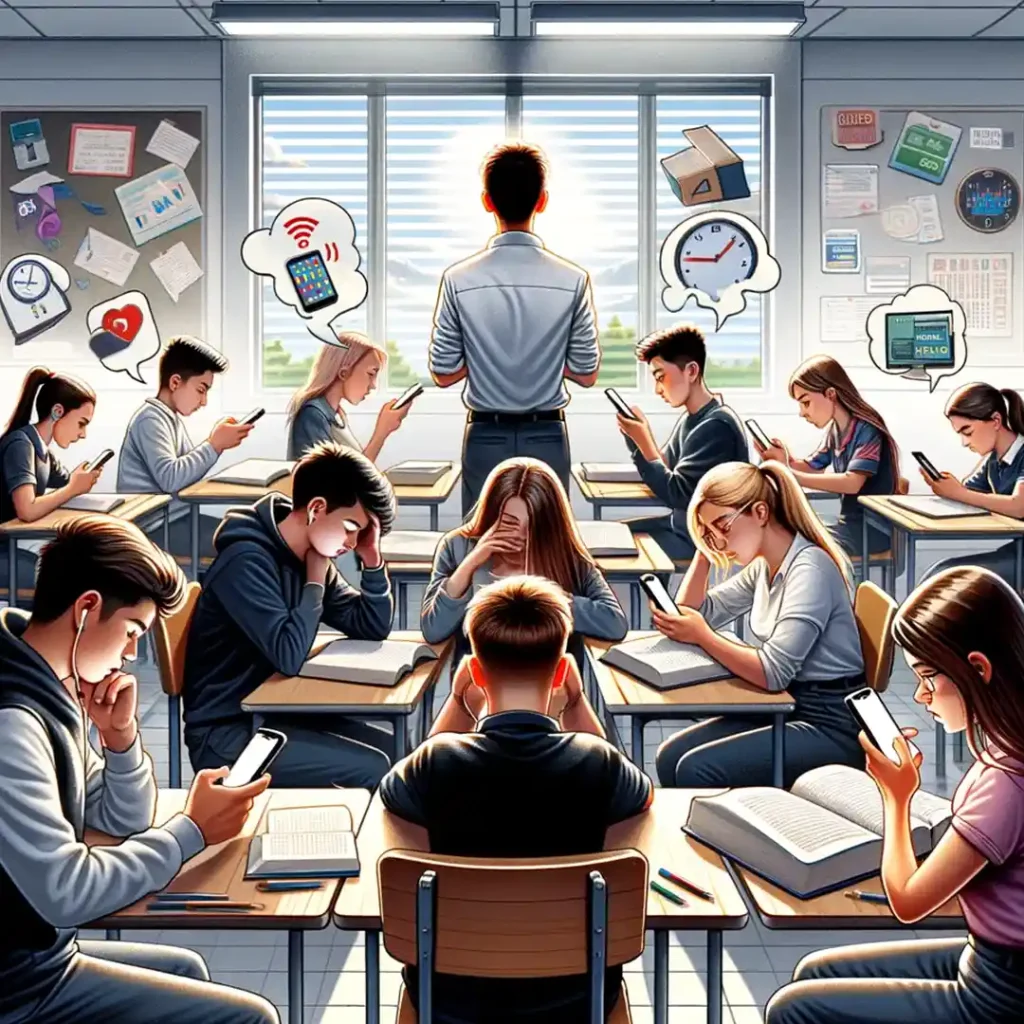In an era dominated by digital innovations, the mobile phone has become a ubiquitous presence in the lives of students. Offering instant access to information, communication, and entertainment, these devices have reshaped the landscape of education and social interaction. However, the benefits of mobile phones are accompanied by significant challenges, particularly concerning mental health and academic performance. This article delves into the multifaceted impact of cell phone addiction, exploring its implications for memory recall, academic achievement, concentration, and psychological well-being. By examining recent studies and expert insights, we aim to shed light on the complexities of mobile phone use among students and the pressing need for effective management strategies.
What is Phone Addiction?
Cell phone addiction is characterized by the compulsive overuse of a mobile phone, manifesting in behaviors such as anxiety over not having access to one’s phone, or the incessant need to send and receive messages. This form of addiction extends beyond mere habitual use, entering the realm of psychological dependency where individuals may experience “phantom vibrations”—the sensation of receiving notifications when none have occurred. This phenomenon underscores the depth of reliance many have developed towards their mobile devices.
A revealing study, conducted among college undergraduates, sheds light on the pervasiveness of cell phone addiction, particularly highlighting the average time spent on phones, which astonishingly ranges between 8 to 10 hours daily. The research aimed to delineate which cell phone activities are most conducive to fostering an addiction. Surprisingly, the findings indicated that not all frequently assumed activities, like internet browsing or gaming, are significant contributors. Instead, the study unveiled that social media platforms such as Instagram and Pinterest are among the key drivers of cell phone addiction. This suggests a strong social underpinning to the addiction, albeit with variations between male and female users in the specific activities that lead to addiction (“Background and Aims”).
Degraded School Performance
The implications of cell phone addiction extend beyond individual well-being, notably impacting educational outcomes. A significant body of research highlights the detrimental effects of excessive phone use on academic achievement. The core issue lies in the division of attention; students engrossed in their phones find it increasingly challenging to concentrate on their studies. This division not only diminishes the quality of study time but also hampers the ability to retain and process information effectively.
A notable study examining the influence of smartphones on the academic performance of Nigerian undergraduates provides further insight into this issue. It delves into the relationship between smartphone usage time and academic achievement, alongside other variables that either directly or indirectly affect this dynamic. Utilizing a descriptive survey design, the study sampled 150 undergraduates from three purposively selected institutions in south-west Nigeria. Through a structured questionnaire, the research unveiled a predominant unawareness among students regarding the impact of smartphone use on their academic performance. Furthermore, it underscored a significant correlation between extensive phone use and lower academic achievement, reflecting the profound distraction these devices pose within the educational sphere (“Influence of Time-on-Phone”).
Reduced Student Concentration
One factor that causes diminished performance in school in the fact that cell phones diminish concentration. The encroachment of mobile phones into the study environment has been shown to severely impair students’ ability to focus. Studies indicate that merely having a phone visible while studying can slash concentration levels by 20%, even if the device is not in use. This decrease in focus directly undermines the learning process, highlighting the importance of minimizing distractions to maintain academic efficiency.
Encouraging students to segregate their phones from their study areas can markedly improve concentration. Simple measures, such as storing phones in another room or in a designated spot where they are out of sight, can significantly mitigate their distracting influence. This strategy enhances focus and fosters a more conducive learning environment.
The challenge of maintaining concentration among high school students in the current era is further exacerbated by the plethora of distractions that pervade classroom settings. A study exploring the effects of technology and other distractions on student concentration in Saudi Arabia sheds light on this issue. Through surveys involving 265 students, the study identified various distractions, both internal (self-generated) and external, that detract from students’ ability to concentrate on class materials. Notably, ringing or buzzing cell phones emerged as the most significant electronic distraction, reported by 68% of participants.
This research underscores the pressing need to address and minimize distractions within educational environments to safeguard students’ concentration and learning potential (“Effects of Technology”).
Effects on Student Memory
The disruption caused by phone messages and notifications plays a critical role in the relationship between smartphone use and memory performance. These interruptions can significantly impede the learning process by causing cognitive overload, a state in which the brain is inundated with more information than it can effectively process or store. This overload is particularly detrimental during tasks requiring focus and concentration, such as studying, as it hampers the efficient transfer of information from working memory to long-term memory. Consequently, this disruption in the information transfer process can prevent students from retaining essential knowledge, impacting their academic performance and learning outcomes.
Mobile phone use can lead to slower response times in memory recall tasks. The distraction caused by smartphones not only affects immediate task performance but also has longer-term implications for memory recall and academic achievement. Additionally, the study pointed out that being consciously aware of one’s phone, even without actively using it, can worsen memory recall—a finding that resonates with the broader concerns about cognitive overload and distraction (“Effects of Smartphone”).
Heightened Anxiety from Excessive Mobile Phone Use

The connection between excessive mobile phone use and deteriorating psychological health is increasingly evident, highlighting concerns such as heightened anxiety, feelings of loneliness, and diminished self-esteem among users. Students, in particular, may experience negative emotions like annoyance, frustration, and impatience when unable to access their mobile devices. This dependency not only impacts their emotional well-being but also their ability to engage meaningfully with the world around them.
A critical aspect of managing this dependency involves addressing the instant gratification that mobile phones provide through constant scrolling and interaction, which releases dopamine, known as the “feel-good” hormone. While this release provides temporary pleasure, overuse of mobile phones can lead to a depletion of dopamine levels, resulting in increased stress and irritability when not using the device. Encouraging regular breaks from screen time allows for the replenishment of dopamine levels, fostering a healthier psychological state and reducing the propensity for anxiety.
A study conducted among undergraduate university freshmen at Ramon Llull University in Barcelona, Spain, explores the maladaptive use of the Internet and mobile phones. The study assessed the negative consequences of this usage, the role of perceived emotional intelligence, and its correlation with symptoms of psychological distress and mental disorder. Findings revealed a clear link between psychological distress and maladaptive use of digital technologies. Notably, female participants reported higher levels of negative consequences from mobile phone use than males. Moreover, students majoring in Journalism and Broadcasting exhibited more maladaptive patterns of Internet use compared to their peers in other fields.
This research underscores the importance of perceived emotional intelligence in mitigating the impact of maladaptive technology use. Although it contributes to understanding psychological distress, the influence of emotional intelligence is less significant than the direct effects of maladaptive Internet and mobile phone usage. These insights emphasize the need for strategies that help individuals manage their digital consumption and enhance their emotional intelligence, thereby promoting better mental health and well-being (“Maladaptive Use of the Internet”).
Conclusion
It is evident that one action stands out in its potential to safeguard students’ academic and psychological welfare: eliminating cell phones from the classroom. While the very suggestion might incite a chorus of groans and eye-rolls from students, envisioning a classroom devoid of the constant buzz and glow of screens offers a glimpse into a more focused and mentally healthy learning environment.
The evidence is clear—reducing cell phone use can enhance memory recall, improve academic performance, heighten concentration, and alleviate anxiety. Embracing this change requires a collective effort from educators, parents, and students themselves. It’s a move that may not win the popularity contest in the short term, but the long-term benefits are too significant to ignore. So, as we contemplate this call to action, let’s brace ourselves for the initial backlash, armed with the knowledge that one day, students might just thank us for this favor. After all, it’s not every day that a decision can simultaneously boost academic success and mental health. And who knows? In a future where students are more focused, less anxious, and perhaps even happier, they might look back and see this as the moment that set them on the path to true learning and well-being. So, let’s take a bold step toward a cell phone-free classroom, knowing that the benefits far outweigh the temporary inconvenience. After all, in the grand scheme of things, a little grumbling now is a small price to pay for a brighter, more focused future.
Relevant Ted Talks
References
“Effects of Technology and Other Types of Classroom Distractions on Students’ Concentration.” NCBI.
“Effects of Smartphone Use on Memory Recall Accuracy and Cognitive Functions.” NCBI.
“Influence of Time-on-Phone on Undergraduates’ Academic Achievement in Nigerian Universities.” ResearchGate.
“Maladaptive Use of the Internet and the Mobile Phone: Related to Symptoms of Psychological Distress and Mental Disorder.” ScienceDirect.


